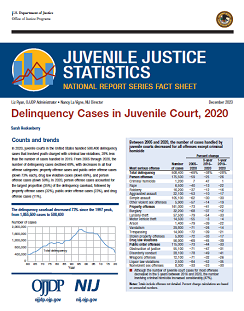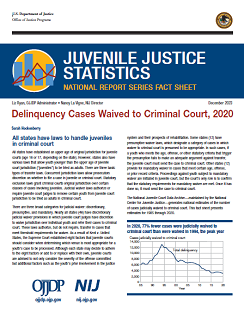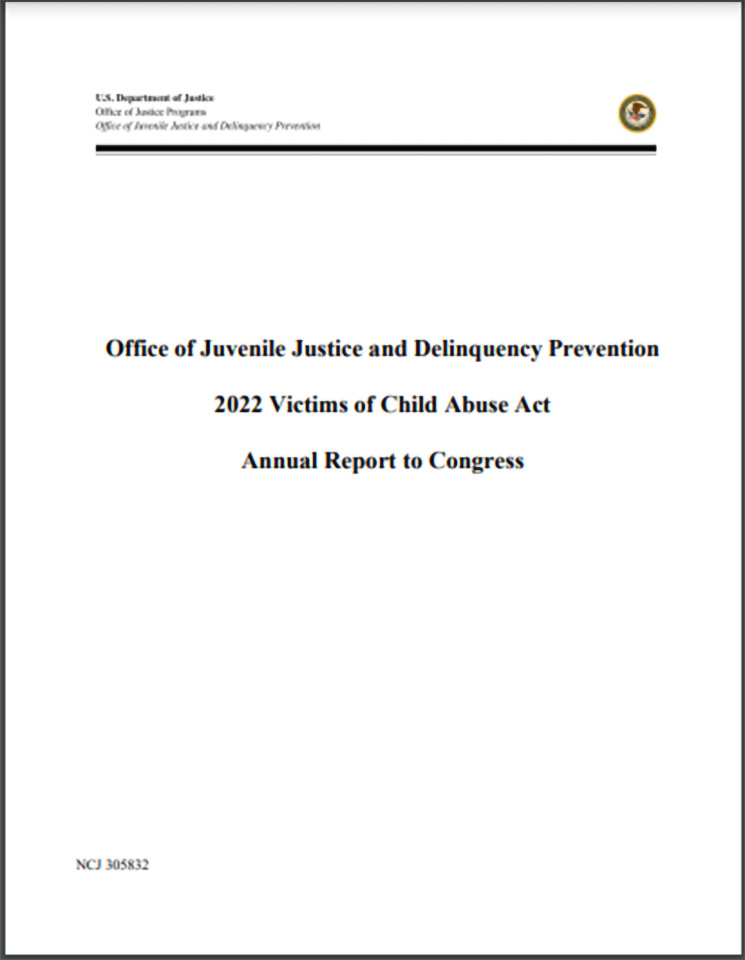All OJJDP publications may be viewed and downloaded on the publications section of the OJJDP website.
Delinquency Cases in Juvenile Court, 2020 (Fact Sheet)
NCJ 306202
The findings in this fact sheet are based on data from nearly 2,400 courts with jurisdiction over 84 percent of the nation’s juvenile population. Juvenile courts’ delinquency caseloads are characterized by gender, race, age, likelihood of detention, intake decision, and outcome of adjudication and disposition. In 2020, juvenile courts handled 508,400 delinquency cases that involved youth charged with criminal law violations, 28 percent fewer than the number handled in 2019. From 2005 through 2020, delinquency cases declined 69 percent with decreases in all four offense categories: property offense cases, public order offense cases, drug law violation cases, and person offense cases. The fact sheet refers to the potential impact of the COVID-19 pandemic on policies, procedures, and data collection, and notes that stay-at-home orders and school closures likely impacted referrals to juvenile court in 2020.
View and download this publication.
Delinquency Cases Waived to Criminal Court, 2020 (Fact Sheet)
NCJ 306201
This fact sheet provides an overview of delinquency cases judicially waived to criminal court, characterizing them by gender, race, age, and type of offense. In 2020, 77 percent fewer delinquency cases were waived to criminal court than were waived in 1994, the peak year (an estimated 13,000 cases in 1994 versus an estimated 3,000 cases in 2020). That number has dropped steadily since 1994, due in part to the decline in crimes by youth but also to the expansion of laws that allow more cases to bypass the juvenile court system and be filed directly in adult criminal court. The fact sheet notes that the start of the COVID-19 pandemic in 2020 may have impacted policies, procedures, and data collection activities regarding referrals to and processing of youth by juvenile courts.
View and download this publication.
OJJDP 2022 Victims of Child Abuse Act Annual Report to Congress
NCJ 305832
Annual Report Archive
Programs supported by the Victims of Child Abuse Act Reauthorization Act of 2018 (VOCA Act) are intended to improve the community response to child abuse through strategic leadership, collaboration, and capacity building. OJJDP administers funds to support children’s advocacy centers (CACs)—which provide children and families access to multidisciplinary teams of professionals who respond to and help heal victims of child abuse—and training and technical assistance. This report responds to reporting requirements of the VOCA Act and provides an overview of OJJDP’s five interconnected VOCA funding initiatives:
- CACs membership and accreditation
- Regional CACs
- Subgrants to local CACs, state chapters of CACs, and multidisciplinary teams
- Training and technical assistance for child abuse professionals
- Training and technical assistance for child abuse prosecutors
The report includes a chart outlining the history of funding amounts for each VOCA program. In fiscal year 2022, the Office awarded more than $31 million to support VOCA programs. The report also outlines efforts made by OJJDP’s VOCA partners to serve rural communities under the regional CACs program.
View and download the 2022 VOCA report.





